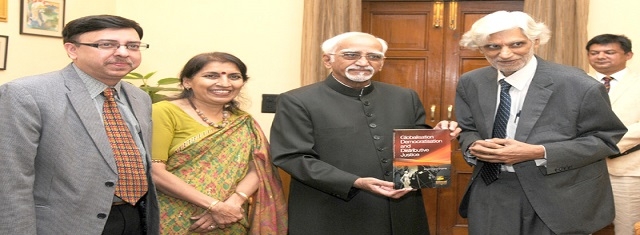News
Book “˜Globalization, Democratization and Distributive Justice´ Presented
Initiatives Can Prove Catalyst

Mr. Mohd. Hamid Ansari being presented a book. (Source: PIB/GR/TYP/BIN/USPA/WN)
USPA NEWS -
The Vice President, Mr. Mohd. Hamid Ansari being presented a book entitled “˜Globalisation, Democratization and Distributive Justice´, authored by Prof. (Dr.) Mool Chand Sharma, Professor of Law at Delhi University and the Member of Law Commission of India, in New Delhi on September 02, 2015.
The Vice President of India Mr. Mohd. Hamid Ansari was presented with a book entitled “Globalization, Democratization and Distributive Justice“ on September 2, authored by Prof. Mool Chand Sharma, Professor of Law at Delhi University and the Member of Law Commission of India. The Vice President congratulated the Author for bringing out such a valuable book.
The book acknowledges that apart from measures like Employment Guarantee Act, Right to Education Act and Food Security Act some of the recent steps taken on economic and fiscal side like introduction of Goods and Services Tax, schemes related to financial inclusion etc., along with initiatives like: “˜Make in India´, “˜Digital India´, “˜Skill India´ and “˜Swachchh Bharat Abhiyan´ can prove catalyst in this regard.
-------------------------------------------------------------------------------------------------------------------------------------------------------------------------------------------------------------------------------------------------------------------------------------------------------------------------
-------------------------------------------------------------------------------------------------------------------------------------------------------------------------------------------------------------------------------------------------------------------------------------------------------------------------
Doruvu Paul Jagan Babu New Delhi India Vice President Mohd. Hamid Ansari Globalization Democratization Distributive Justice
Liability for this article lies with the author, who also holds the copyright. Editorial content from USPA may be quoted on other websites as long as the quote comprises no more than 5% of the entire text, is marked as such and the source is named (via hyperlink).





